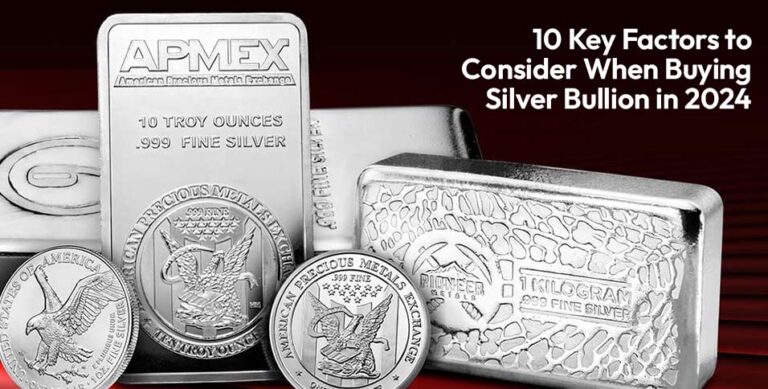As we move through 2024, buying silver bullion remains an attractive investment option for Australians seeking financial security and growth potential. However, purchasing silver bullion involves more than just picking a shiny bar; it requires careful consideration of various factors that can influence both your buying experience and the long-term value of your investment. Here are ten key factors to consider before purchasing silver bullion.
1. Purity of Silver
Silver bullion comes in different purities, with fine silver typically indicating bullion that is 99.9% pure. The purer the silver, the greater its value. Always ensure that the silver bullion you purchase meets the industry standard for investment-grade silver. Most reputable dealers provide certificates of authenticity, but it’s important to verify the legitimacy of these claims.
2. Weight and Size of Bullion
Silver bullion is available in a range of weights, from small one-ounce bars and coins to larger kilogram bars. The right choice depends on your investment strategy, budget, and liquidity needs. Smaller bars or coins tend to be more accessible and easier to trade, while larger bars are often more cost-effective but may be more difficult to liquidate quickly.
3. Form: Bars or Coins?
When it comes to buying silver, you can choose between bars or coins. Silver bars typically have lower premiums over the spot price and are easier to store in bulk. Coins, however, may come with a higher premium but tend to be more desirable among collectors and easier to sell. Additionally, some coins may carry numismatic value, where their worth can exceed their silver content.
4. Storage Options
Proper storage is crucial when investing in silver bullion. While many Australians opt to store their bullion at home in a secure safe, others prefer using bank safety deposit boxes or private precious metal storage facilities. These specialised facilities often offer high levels of security and insurance, giving investors peace of mind. Make sure the storage option you choose aligns with your budget and security needs.
5. Dealer Reputation
One of the most important factors when buying silver bullion is selecting a reputable dealer. Look into the dealer’s background, read customer reviews, and verify any industry certifications. Be wary of extremely low prices that seem too good to be true, as scams are not uncommon in the precious metals market. A trustworthy dealer will provide transparency regarding the bullion’s origin and authenticity.
6. Market Timing
The timing of your purchase can greatly influence the value of your silver investment. Silver prices fluctuate based on global economic trends, inflation rates, and market demand. Staying updated on the latest silver spot price can help you make well-timed purchasing decisions. While waiting for price dips can be beneficial, it’s important to acknowledge that predicting market movements is never guaranteed.
7. Tax Implications
In Australia, silver bullion is subject to Goods and Services Tax (GST). When budgeting for your silver purchase, be sure to account for this additional cost. While gold bullion is GST-free, silver does not enjoy the same exemption. It’s a good idea to consult a tax professional or financial advisor to fully understand how taxes may affect your investment and potential returns.
8. Liquidity and Exit Strategy
Planning your exit strategy is just as critical as deciding when to buy. Consider how easy it will be to sell your silver bullion when the time comes. Coins, for example, are often easier to liquidate than larger bars due to their popularity among collectors and investors. Additionally, some dealers offer buyback options, which can provide a convenient way to sell your silver at a competitive price.
9. Premiums and Fees
When purchasing silver bullion, the price you pay will include a premium over the spot price. This premium accounts for factors such as minting, refining, and the dealer’s mark-up. Silver coins, in particular, often carry higher premiums than bars. It’s essential to review all associated fees, including shipping, insurance, and storage costs, to avoid any surprises.
10. Geopolitical and Economic Conditions
Silver prices can be heavily influenced by global economic and geopolitical events. In times of political uncertainty or economic downturns, silver, like gold, is often viewed as a safe-haven asset. Understanding how factors like inflation, global trade tensions, and interest rate changes affect the silver market can provide valuable insights when making buying decisions.
Key Insight: The Strategic Approach
Investing in silver bullion can be a smart way to diversify your portfolio and protect your wealth in uncertain economic times. By carefully considering these ten factors, you can make well-informed decisions that align with your financial goals. Whether you’re a first-time buyer or a seasoned investor, a strategic approach to purchasing silver bullion in 2024 will position you for long-term success.















